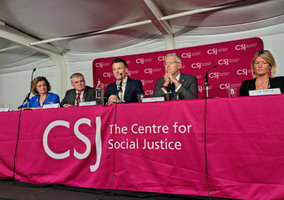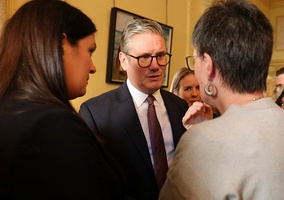The Civil Society Covenant will require “a new way of funding and commissioning” to succeed, the chief executive of the Lloyds Bank Foundation has said.
Earlier this week, People’s Postcode Lottery hosted a fringe event at the Labour Party Conference on the future of the charity sector.
Discussing the covenant – a set of principles published in July to underpin the government’s relationship with the sector – Matt Hyde said it will not make a difference on its own, but is “very important mood music”.
He said: “We believe that’s one of the most significant commitments at the highest levels of government that there’s been.
“And it’s got to work not just in Whitehall. Yes, it’s got to work across national government, regional government, but critically, local government as well.
“So, what are the success factors? Well, this is going to require a new way of funding and commissioning, and it’s going to require culture change and leadership.”
Hyde said there were local “examples that can inspire us” including in areas such as Wigan where civil society is afforded “deeper levels of ownership”.
“So, I think the measures would be: Is the money flowing differently? Do people feel that it’s different and it’s changing? Do the voluntary and community sector [...] feel that they have respect and that they’re a genuine partner?
“Are they co-producing in a way that they’re at the start of those discussions, or are they the add-on that’s the tick on the checklist?”
‘We’ve got to innovate’
The session also explored volunteering engagement and declining levels, with the chair asking how the charity sector could innovate and reach a younger audience.
Catherine Johnstone, CEO of the Royal Voluntary Service, said: “When there’s a crisis, everyone is a volunteer. Everyone sees the power, the sheer force.
“Most of you wouldn’t have got your injections, your vaccinations, had it not been for the ‘jabs army’ and literally hundreds of thousands of people stepping forward, never having given an objection before in their lives to be trained in 24 hours to start jabbing needles.
“We’re built as a country on the necessity of everyone needing to play their part. And I guess where we are now is that we’ve got out of the rhythm.
“Over the last 20 years, we’ve relied, thankfully, on our aged population to step forward and to do more and more volunteering because we have, as a UK, only seen time being able to be given by people who are largely – don’t get me wrong – white middle class with access to means and with lots of time.”
Johnstone said that while that saved public services in terms of plugging the gaps, “we’ve got to move away from that and we’ve got to innovate”.
“And we’ve got to enable everybody in every life course, I’d argue, from birth to death, to be able to see, playing their part, just the natural part of who we are if we live in this country,” she added.
She said many other countries do that very well, but that “we’ve got a way to go” as some organisations are making it “quite difficult for people to be able to volunteer”.











